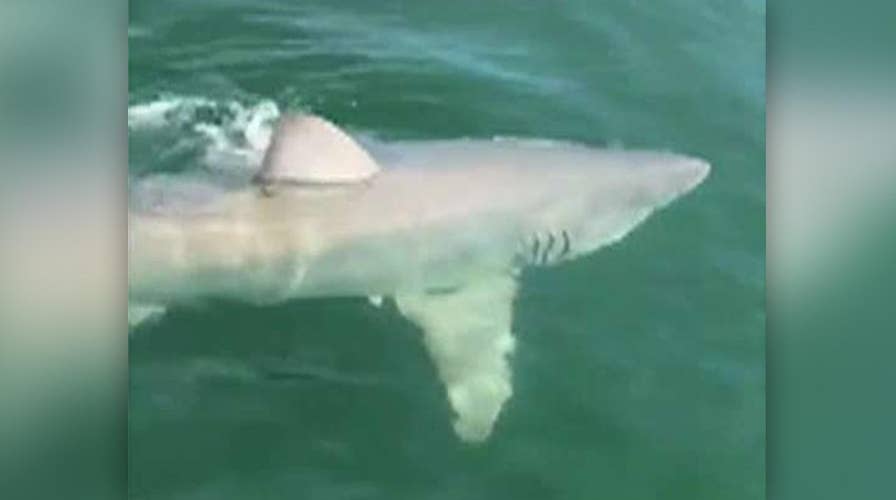Fishermen encounter huge great white shark off Florida coast
Massive shark circles boat giving group of fishermen quite a thrill.
Beachgoers in Great Yarmouth, England, are afraid to take a dip in the waters off the British coast after half-eaten dolphins washed ashore over the weekend. Locals fear a "monster" great white shark is to blame.
The first dolphin carcass was discovered early Saturday on Yarmouth's Pleasure beach, according to The Sun. A day later, another mangled dolphin washed ashore.
"It's pretty frightening - it can't be a coincidence that something out there keeps attacking and eating seals, dolphins and porpoises," resident Stephen McHugh, 24, told the British newspaper.
Based on the bite marks, residents believe it's the work of a great white shark — but wildlife officials aren't so sure.
GREAT WHITE SHARK HILTON, 1,326-POUND REAL LIFE 'JAWS,' SPOTTED OFF GULF COAST
“While there is no reason why great whites should not be found in British waters (e.g. water temperature, prey availability - seals, large fish), to-date there is no concrete evidence to support their presence," John Richardson, conservation officer for The Shark Trust, told The Sun.
“I would speculate that the first was a live stranding given the condition when it came in and what and where it is. Hopefully the post-mortem will shed more light on it," Institute of Zoology project manager Rob Deaville added.
There are many predatory sharks present in British waters, including thresher, basking, porbeagle and whitetip sharks. A great white shark, however, is not on the list.
But Richard Peirce, chairman of the Shark Trust, told the BBC in August 2011 that it was only "a matter of time" before the giant creatures made their way to the U.K.
GIANT GREAT WHITE SHARK CAUGHT ON CAMERA CIRCLING MAN'S BOAT: 'IT WAS LIKE A MOVIE'
"Great whites are highly nomadic in movement around the north Atlantic so it's reasonable to say there's a good chance they may stray into British waters," Peirce said.
A fisherman claimed to have spotted a great white off Cornwall in the 1970s, and three more reported seeing the shark on three separate occasions in 1999, the BBC reports.
"The closest capture of a great white was off La Rochelle (in western France) about 200 nautical miles from UK shores which is no distance to them," Peirce explained.
If it does turn out to be a great white shark, residents hope it steers clear of crowded beaches.
"If it is a great white, let's hope it doesn't come into the warmer shallow water close to the shore when people are on the beaches in the summer," McHugh told The Sun.
Great white sharks can grow up to 20-feet long and weigh up to 2.5 tons, making them the largest predatory fish to roam the sea, according to National Geographic. But they're not as lethal as you might imagine.
"Of the 100-plus annual shark attacks worldwide, fully one-third to one-half are attributable to great whites," National Geographic reports. "However, most of these are not fatal, and new research finds that great whites, who are naturally curious, are 'sample biting' then releasing their victims rather than preying on humans."




















